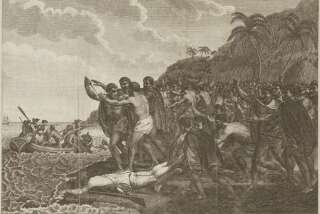Sea Superstitions Are Hard to Fathom
- Share via
If you are a cross-eyed redhead who walks with a limp, better stand your ground. They don’t want you out on the waves.
Take it from Horace Beck, who has spent much of his life studying the lore, tales and superstitions of the sea. In fact, he has just concluded four lectures on the subject in a series sponsored by UCLA Extension.
“I once found out firsthand how much weight some superstitions have at sea,” he recalled last week before departing for his home in Vermont. “In the late ‘60s my wife, Jane, and I sailed to Scotland. Despite the fact it was a foggy night when I arrived, I was able to get our sloop into the harbor safely--and the local fishermen were impressed.
“I got an invitation to go to sea with them, and immediately snapped it up.”
Change of Luck
Within a couple of weeks the galley of the trawler caught fire, the $50,000 fishing net broke loose on the bottom of the North Sea and had to be retrieved with a grappling iron and then the winch stopped working.
The cruise had at least another week to go, but the captain headed back to port and invited the guest passenger to disembark. The captain said he knew when he had a Jonah aboard.
“I knew there were certain words I shouldn’t have used while at sea,” Beck reflected.
He didn’t say the captain’s mother wore combat boots, but he did refer to a rabbit.
“In that fishing area of the world, you didn’t say rabbit , pig , salmon or minister ,” Beck said. “You substituted words such as four - foot , curly - tail , red fish or white collar.
“Having studied superstitions, I was aware of this, but once when they asked me what I did in Vermont, I blurted out that I shot rabbits.
“The captain jumped up and shouted: ‘Man, do you want to drown us all?’ ”
Looking back now at his adventures at sea and his studies of it, the 64-year-old Beck, who has been on the faculty of Middlebury College the last 30 years, mentioned a few other no-nos.
“A clergyman is never welcome on the waters. That is pretty general throughout the world. And, in certain areas, they don’t want you aboard if you are cross-eyed or lame. Or if you are a redhead--especially if everybody else has brown hair.”
While in Scotland, the professor heard of an incident involving a clergyman. “A minister with good intentions had come dockside in Fraserburgh to bless the fleet. All the vessels except one had escaped. Upon seeing the minister, its skipper was so horrified that he sailed the harbor counterclockwise seven times, as fast as he could go, blowing his horn all the way, before he felt it was safe to head out for sea.”
Time doesn’t exactly fly when one is part of a crew seeking to catch whales in what used to be called the West Indies, and while thusly occupied for 105 days Beck soaked up other superstitions.
Exchange of Tales
“We swapped stories every day. I learned, for instance, about a burial at sea in that part of the world. While proceeding to the site, you alternate one oar stroke through the water, one through the air. The water represents the body, the air represents the spirit.”
For a lull in the conversation at your next party, consider a seafaring saying which, according to Beck, means that times are bad enough now, so don’t worry about the future. The sailors in what now is the Lesser Antilles say: “A dead hog never studies boiling water.”
Safe to say that most fishing vessels don’t have rows designated for nonsmokers. Pipe smoking, especially, is thought to discourage the arrival of ghosts.
Tattoos, of course, are well engraved in maritime lore.
“When I was in Scotland I came across a youth who had fallen overboard three times while at sea,” the professor said. “No one wanted him on their ship anymore. They insisted that the reason for his accidents was that he refused to get tattooed.”
Marked for Good Luck
Popular among fishermen, Beck went on, is a tattoo of a pig on one instep, a rooster on another. “One reason is that those creatures rarely drown. Also, having such tattoos supposedly guarantees a future of bacon and eggs.”
Another good-luck tattoo--actually eight of them, on the backs of the fingers--is “Hold Fast,” to preclude falling overboard.
Tattoos also are akin to automobile bumper stickers that proclaim the faraway destinations the motorist has visited. “Veteran sailors often can look at tattoos and identify particular artists by the style, thereby knowing which ports the owner has visited.”
Not only did Beck go whaling as a guest in the former West Indies, he did likewise for comparison purposes in the Kingdom of Tonga.
“One thing I found out was that whereas the West Indian sailors are excitable, the Polynesians are just the opposite. One time a whale unexpectedly breached, and just about came into the boat. The guy on one side of me kept blowing smoke rings, and the one on the other side calmly continued eating his raw fish.”
Although away from their families for much of the time, the Polynesian sailors aren’t self-centered. It takes two to Tonga.
“The harpooner on our boat told me his deceased grandfather had no tombstone back in Ha’apai,” Beck recalled. “He said he wanted some day to catch a whale so big that he could make a tombstone out of its jaw.
“I met him again four years ago in Los Angeles, and he told me he had finally caught such a whale. He had engraved both the name of his grandfather and of the man’s fishing crew on the jaw, and to this day it marks the grave site.”
Strange Fare
Eating habits of those who make their living at sea are also part of the lore. “While in the trawler off Scotland, I soon found out that my diet for the day was likely to be nothing more than canned peaches and whiskey.
“When they began fishing, they would go for 36 hours straight, until the pens were filled. The sweets gave them energy, and the alcohol kept them awake.”
In the former West Indies, after the crew that Beck accompanied finally harpooned a humpback, he discovered that not everything tasty has to come from a supermarket.
“Cooked whale is as good if not better than the very best beef. The natives cook it right in its own blubber.”
So much known about seafarers, yet so much to be learned. For this reason, the Becks plan to sail to Portugal and other ports this summer. On the agenda: More whaling by him, more soaking up of yarns by both of them.
They feel certain that wherever their voyage takes them, there oughta be a lore.
More to Read
Sign up for Essential California
The most important California stories and recommendations in your inbox every morning.
You may occasionally receive promotional content from the Los Angeles Times.













